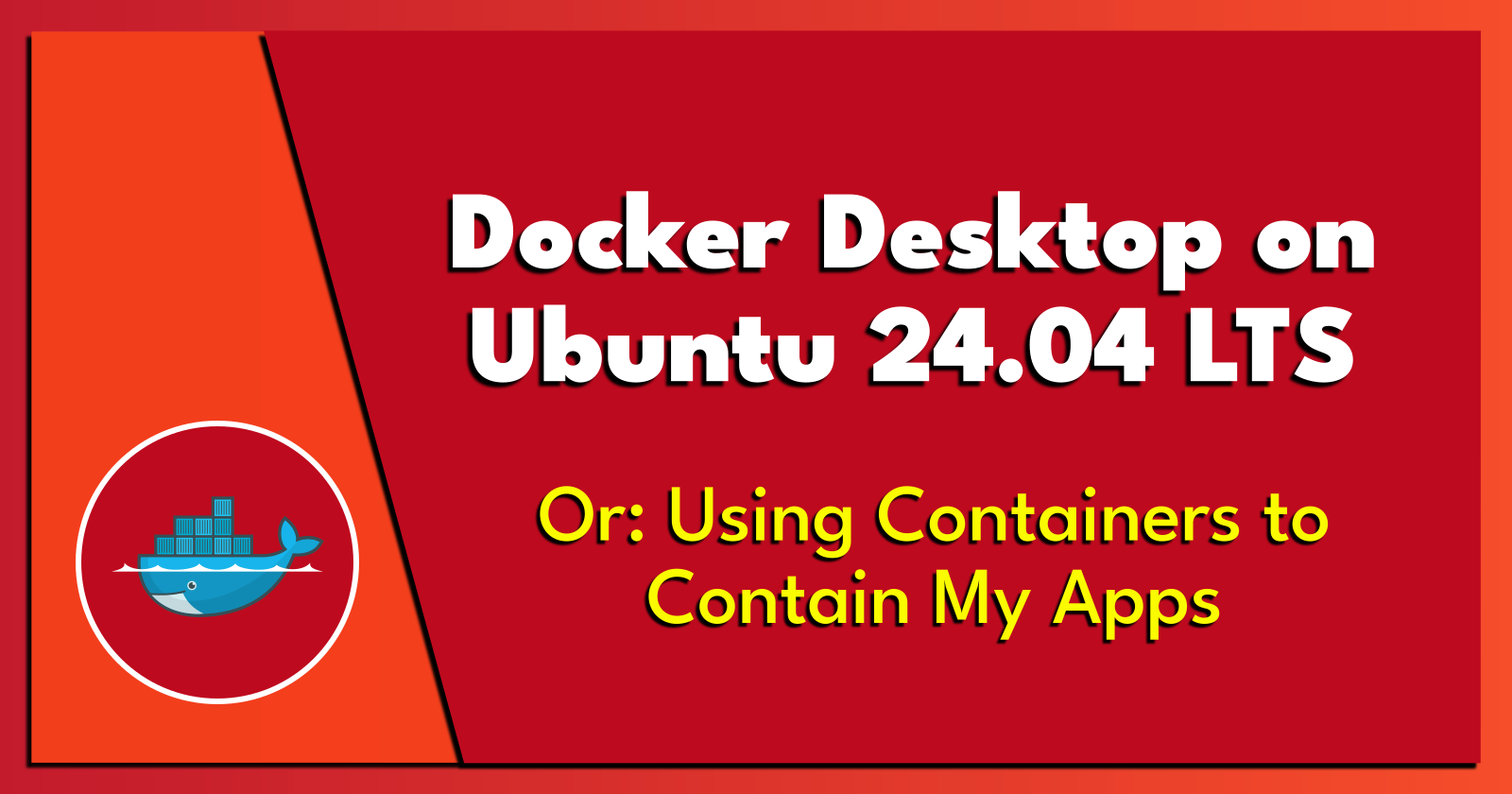Docker Desktop on Ubuntu 24.04 LTS.
 Brian King
Brian King
TL;DR.
This post provides a comprehensive guide on installing and uninstalling Docker and Docker Desktop on Ubuntu 24.04. It covers the prerequisites, step-by-step installation process, and troubleshooting tips, ensuring a smooth setup for managing containerized applications and microservices. The guide also highlights the benefits of using Docker Desktop for efficient software development.
Attributions:
An Introduction.
Docker and Docker Desktop are essential tools for modern software development. Whether you're a beginner or an experienced developer, this article will help you enhance your development workflow.
The purpose of this post is to describe how to install Docker and Docker Desktop on Ubuntu 24.04.
The Big Picture.
Docker and Docker Desktop are pivotal to modern software development. The containerisation approach to coding enhances the portability and scalability of applications across different platforms, eliminating any “it runs on my system” obstacles.
Prerequisites.
- A Debian-based Linux distro (I use Ubuntu).
Updating my Base System.
- From the (base) terminal, I update my (base) system:
sudo apt clean && \
sudo apt update && \
sudo apt dist-upgrade -y && \
sudo apt --fix-broken install && \
sudo apt autoclean && \
sudo apt autoremove -y
NOTE: The Ollama LLM manager is already installed on my (base) system.
What is Docker?
Docker is used to containerise apps (and their dependencies) so they can run on any desktop and/or server operating system.
Installing Docker.
Attribution:
https://linuxiac.com/how-to-install-docker-on-ubuntu-24-04-lts/ ↗.
- From the terminal, I add HTTPS and the Curl utility:
sudo apt install -y apt-transport-https curl
- I import the Docker GPG repository key:
curl -fsSL https://download.docker.com/linux/ubuntu/gpg | sudo gpg --dearmor -o /etc/apt/keyrings/docker.gpg
- I add the official Docker repository to my system:
echo "deb [arch=$(dpkg --print-architecture) signed-by=/etc/apt/keyrings/docker.gpg] https://download.docker.com/linux/ubuntu $(. /etc/os-release && echo "$VERSION_CODENAME") stable" | sudo tee /etc/apt/sources.list.d/docker.list > /dev/null
- I refresh my local repo list:
sudo apt update
- I install Docker:
sudo apt install -y docker-ce docker-ce-cli containerd.io docker-buildx-plugin docker-compose-plugin
- I check to see if Docker is active:
sudo systemctl is-active docker
- I test the installation:
sudo docker run hello-world
Uninstalling Docker.
Attributions:
- From the terminal, I stop the running Docker containers:
docker stop $(docker ps -a -q)
- I remove the Docker containers:
docker rm $(docker ps -a -q)
- I remove the Docker images:
docker rmi $(docker images -a -q)
- I prune the custom Docker networks:
docker network prune
- I prune the Docker containers, networks, images, cache and volumes:
docker system prune -a
- I purge every Docker package:
sudo apt purge docker-* containerd.io --auto-remove
- I remove the Docker files:
sudo rm -rf /var/lib/docker
- I remove the Docker group:
sudo groupdel docker
- I remove the Docker socket:
sudo rm -rf /var/run/docker.sock
- I remove Docker Compose:
sudo rm -rf /usr/local/bin/docker-compose && sudo rm -rf /etc/docker && sudo rm -rf ~/.docker
What is Docker Desktop?
Docker Desktop is used to build, share, and run containerized applications and microservices.
Installing Docker Desktop.
Attributions:
https://docs.docker.com/desktop/setup/install/linux/ubuntu/ ↗,
https://dev.to/chandrashekhar/docker-desktop-is-not-working-on-ubuntu-2404-lts--2kpa ↗.
- I download the latest version of Docker Desktop:
https://docs.docker.com/desktop/release-notes/
- From the terminal, I change to the
Downloadsdirectory:
cd ~/Downloads
- I install the DEB package:
sudo apt install ./docker-desktop*.deb
NOTE: Ignore the error message after installation.
- I fix the permissions issue:
echo 'kernel.apparmor_restrict_unprivileged_userns = 0' | sudo tee /etc/sysctl.d/20-apparmor-donotrestrict.conf
- I reboot my system:
reboot
- After the reboot, I return to a terminal and launch Docker Desktop:
systemctl --user start docker-desktop
- From the Apps Drawer, I pin the Docker Desktop icon to the Dock.
Uninstall Docker Desktop.
- From the terminal, I remove Docker Desktop from my system:
sudo apt remove docker-desktop
- I remove the configuration and data files:
sudo apt remove docker-desktop && sudo rm /usr/local/bin/com.docker.cli && sudo apt purge docker-desktop
The Results.
Setting up Docker Desktop on Ubuntu 24.04 requires a series of steps that ensures a smooth installation process. By following the outlined procedures, I can effectively manage containerized applications and microservices on my system. Docker Desktop provides a user-friendly interface and powerful tools so I can build, share, and run applications efficiently.
In Conclusion.
I have discovered how Docker Desktop can transform my workflow!
Docker is a game-changer, allowing me to containerize my apps and their dependencies, ensuring the app run seamlessly on any platform.
In guide guide, I walked through the steps of installing Docker and Docker Desktop on Ubuntu 24.04.
From updating my base system to fixing permissions issues, I've covered my simple installation process.
With Docker Desktop, I can easily build, share, and run containerized applications and microservices.
It's all about efficiency and user-friendly interfaces!
Curious about the uninstallation process? I've included that too, ensuring I have complete control over my rig.
By following these steps, I can effectively manage my containerized applications and microservices, making development a smoother and more efficient process.
Have you tried Docker Desktop on Ubuntu yet? What challenges did you face, and how did you overcome them? Let's discuss below!
Until next time: Be safe, be kind, be awesome.
Hash Tags.
#Docker #DockerDesktop #Ubuntu2404 #Containerization #Microservices #Linux #SoftwareDevelopment #DevOps #OpenSource #DockerInstallation #DockerUninstallation #DockerTips
Subscribe to my newsletter
Read articles from Brian King directly inside your inbox. Subscribe to the newsletter, and don't miss out.
Written by

Brian King
Brian King
Thank you for reading this post. My name is Brian and I'm a developer from New Zealand. I've been interested in computers since the early 1990s. My first language was QBASIC. (Things have changed since the days of MS-DOS.) I am the managing director of a one-man startup called Digital Core (NZ) Limited. I have accepted the "12 Startups in 12 Months" challenge so that DigitalCore will have income-generating products by April 2024. This blog will follow the "12 Startups" project during its design, development, and deployment, cover the Agile principles and the DevOps philosophy that is used by the "12 Startups" project, and delve into the world of AI, machine learning, deep learning, prompt engineering, and large language models. I hope you enjoyed this post and, if you did, I encourage you to explore some others I've written. And remember: The best technologies bring people together.